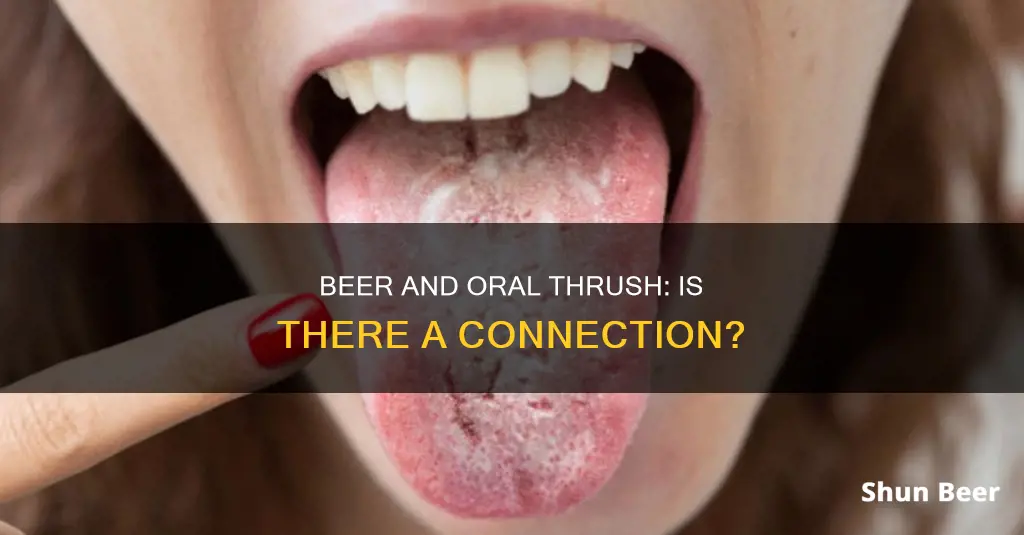
Oral thrush is a yeast infection of the mouth caused by the fungus candida albicans. While it is not directly caused by alcohol, drinking beer can increase the risk of infection as it feeds the fungus. Ethanol is also used by some strains of candida as an energy source. Additionally, alcohol weakens the immune system, making it harder for the body to fight off the infection. Therefore, it is recommended to refrain from drinking beer or any other type of alcohol if one is suffering from oral thrush.
What You'll Learn

Beer contains yeast and ethanol, which can feed the candida fungus
Beer and other yeast-based alcoholic drinks contain moulds, which are favourable for the growth of candida albicans. Ethanol is also used by some strains of candida as an energy source. Therefore, if you are prone to yeast infections, it is best to refrain from alcohol completely.
Additionally, alcohol weakens the immune system, making it harder for your body to fight off candida overgrowth. Alcohol also affects the liver, one of the body's primary defences against candida. It can weaken liver function and prevent it from operating effectively, as it has to work harder to process and eliminate the toxins produced by candida overgrowth.
In conclusion, beer contains yeast and ethanol, which can feed the candida fungus and contribute to oral thrush. To avoid oral thrush, it is best to refrain from drinking beer and other yeast-based alcoholic drinks, especially if you are prone to yeast infections.
Nursing and Non-Alcoholic Beer: What's Safe?
You may want to see also

Drinking beer can weaken the immune system
Drinking beer and other forms of alcohol can weaken the immune system. A study at the University of Maryland found that drinking alcohol caused an immediate rise in immune system activity, with higher levels of white blood cells, monocytes and natural killer cells 20 minutes after 'peak intoxication'. However, this effect was quickly reversed, and at the 2-hour and 5-hour stage, the levels of white blood cells were significantly lower, signalling a weaker immune system.
Alcohol also has other negative effects on the body. It can overload your liver, affect your mood, disrupt your sleep, zap your energy, put more stress on your adrenal glands, and destabilise your blood sugar. All of these effects can further weaken your immune system and make it harder for your body to fight off infections and diseases.
Additionally, alcohol can increase the risk of developing oral thrush, a yeast infection of the mouth caused by the fungus candida albicans. While alcohol itself is not directly related to getting thrush, yeast-based alcoholic drinks such as beer can increase the infection by feeding the damaging fungus. Ethanol, which is present in all alcoholic drinks, can also be used as an energy source by some strains of candida. Therefore, it is best to refrain from alcohol completely if you have thrush or are prone to yeast infections.
Beer and Hydrocodone: Is It Safe to Mix?
You may want to see also

Oral thrush can be caused by poor oral hygiene
Oral thrush is a fungal infection of the mouth, caused by a group of yeasts called Candida. It is not contagious and is usually successfully treated with antifungal medication. While low numbers of the fungus Candida are naturally found in the mouth and digestive system of most people, they don't usually cause any problems. However, an overgrowth of Candida can lead to oral thrush.
Oral thrush can be caused by several factors, one of which is poor oral hygiene. Maintaining good oral hygiene practices is essential in preventing the development of oral thrush. Here are some ways to maintain good oral hygiene and reduce the risk of oral thrush:
- Brush your teeth twice a day with a fluoride toothpaste.
- Use mouthwash regularly.
- Clean oral appliances, such as dentures or retainers, regularly.
- Visit your dentist regularly for check-ups and teeth cleanings, at least every six months.
- Rinse your mouth after meals.
- Change your toothbrush every three months or when the bristles start to splay.
- Floss daily using any type of floss or dental tape.
By following these oral hygiene practices, you can help prevent the overgrowth of Candida and reduce your risk of developing oral thrush.
Beer and Keto: What's Allowed?
You may want to see also

Heavy alcohol consumption can lead to candida overgrowth
Oral thrush is a yeast infection of the mouth caused by a common fungus called candida albicans. While alcohol itself is not related to getting thrush, yeast-based alcoholic drinks such as beer are likely to increase the infection, as they feed the damaging fungus. Ethanol is also used by some strains of candida as an energy source, so it's best to refrain from alcohol completely if you've got thrush.
Beer and other yeast-based alcoholic drinks contain molds that are favorable for the growth of candida albicans. Alcoholic products are all based on ethanol, which may be used as an energy source by some candida strains. Feeding candida is something you don't want to do if you're prone to yeast infections.
Alcohol consumption can also weaken the immune system, intensify mood swings, prevent restful sleep, and lower energy levels. It can overload your liver, which is one of your primary defenses against candida symptoms. Alcohol affects your liver by turning into acetaldehyde, which is a powerful neurotoxin and carcinogen. Additionally, alcohol can put more stress on your adrenal glands, which are already overworked when dealing with chronic conditions like Candida.
If you are suffering from candida overgrowth, it is best to avoid alcohol completely and introduce a bacteria reduction protocol. This will help reduce, eliminate, and prevent a recurring bout of oral thrush.
Beer and Straws: A Refreshing Combination?
You may want to see also

Oral thrush can be treated with antifungal medications
Oral thrush is a yeast infection in the mouth and throat, caused by an overgrowth of the fungus Candida albicans. It is more likely to occur in people with weakened immune systems, such as older people, people with HIV, and babies. It can also be caused by medications such as antibiotics and inhaled steroids, or by chemotherapy.
Oral thrush is often treatable with medication, specifically antifungal medications. Antifungals work by changing the cell wall of the fungus, either preventing it from growing or causing it to die. The best antifungal medication for oral thrush depends on the severity of the infection. For mild cases, topical antifungals such as clotrimazole lozenges, nystatin liquid suspension, and miconazole are usually prescribed. These are taken orally but are only delivered to the mouth area, meaning they have fewer side effects and drug interactions than medications that are swallowed or given intravenously.
For more severe cases of oral thrush, or if topical medications don't work, oral antifungals may be prescribed. The first-choice oral option is usually fluconazole (Diflucan), which is available as tablets or a liquid suspension. If fluconazole is not suitable, alternative options include itraconazole solution (Sporanox) and posaconazole suspension (Noxafil). In very severe cases where oral medication is ineffective, intravenous medications such as amphotericin B, caspofungin, and micafungin may be used in a hospital setting.
It is important to take the full course of antifungals prescribed by your healthcare provider, even if you feel better before you finish the medication. Side effects from antifungals can range from mild to severe and depend on the medication and the strength of the patient's immune system. Common side effects include changes in liver tests, nausea, mouth irritation, vomiting, stomach upset, diarrhoea, headache, and stomach pain.
Beer and Metro North: What's Allowed?
You may want to see also
Frequently asked questions
Yes, drinking beer can increase the risk of oral thrush as it feeds the fungus candida albicans, which causes the infection.
Oral thrush is a yeast infection of the mouth caused by the fungus candida albicans. It is characterised by white or pinkish blotches on the tongue, gums, the sides or roof of the mouth, and the back of the throat.
Symptoms of oral thrush include a burning pain in the mouth or throat, altered taste (especially when eating spicy or sweet foods), and difficulty swallowing.
Oral thrush can be treated with antifungal medications such as fluconazole, or home remedies such as coconut oil, baking soda, or apple cider vinegar.
To prevent oral thrush, it is recommended to avoid yeast-based drinks like beer and include probiotics such as yogurt, cheese, and milk in your diet. Maintaining good oral hygiene and avoiding sugary and alcoholic drinks can also help prevent the infection.







